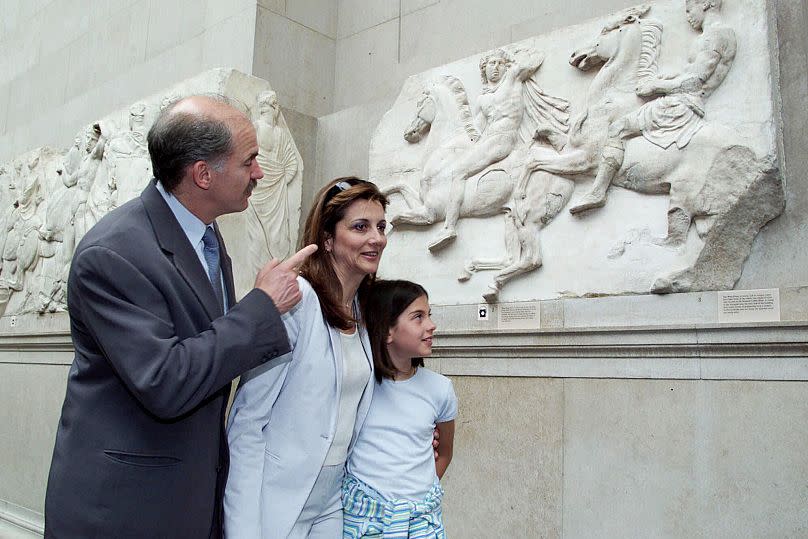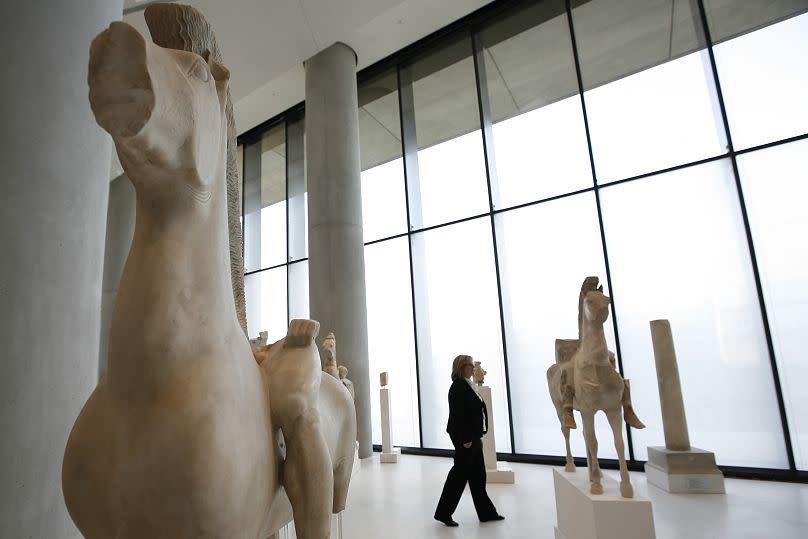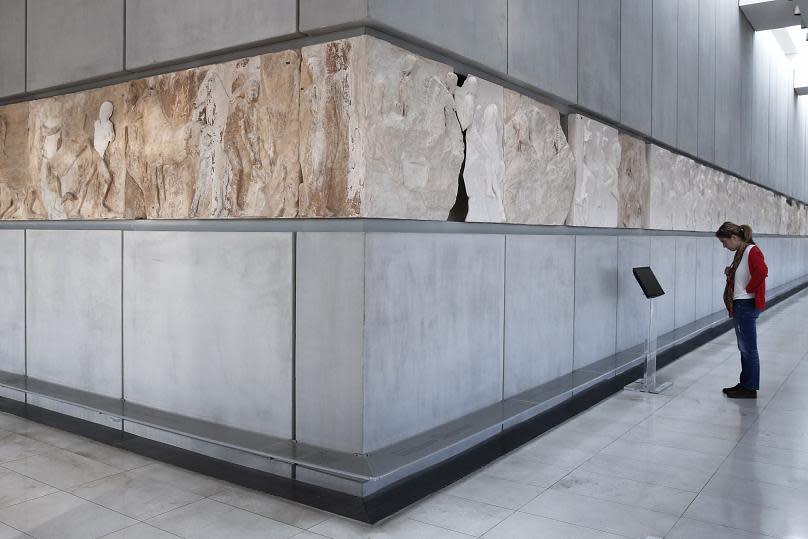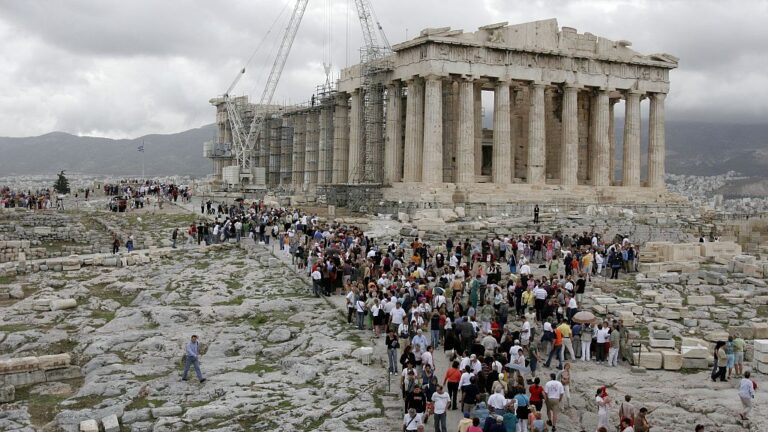What should museums do with antiquities seized during colonial periods? This is the question at the heart of a rift between the Greek and British governments.
For more than 40 years, the Greek government has been pushing for the return of the Parthenon marbles. While UK policy has been an outright refusal for most of this period, the past year has seen momentum build behind efforts to return prized antiquities.
On November 15, former chancellor and chairman of the British Museum, George Osborne, said he hoped the museum could “reach an agreement with Greece”. This hope was shattered as Prime Minister Rishi Sunak left the negotiations this week, leaving the Greek Prime Minister Kyriakos Mitsotakis to express his “annoyance”.

The Parthenon Marbles, also known as the Elgin Marbles, have been housed in the British Museum in London for over 200 years.
The Parthenon Marbles are a collection of sculptures built between 447 and 438 BCE that adorned the Acropolis of Athens. Between 1801 and 1812, the 7th Earl of Elgin authorized the sculptures to be removed and transported to Britain. At the time, he claimed to have been legally authorized to do so by the ruling Ottoman Empire.
Last year, UNESCO hoped to facilitate discussions between the two countries regarding the return of ancient Greek marbles. Greece has been trying to reclaim the marbles since 1983 and Greek Prime Minister Mitsotakis has made them a central part of many negotiations with British Prime Ministers Boris Johnson and Sunak.
Mitsotakis was due to meet Sunak today (November 28) during a visit to London to discuss Israel’s war with Hamas, Russia’s invasion of Ukraine and the marbles.
However, late Monday evening, Mitsotakis issued a statement to “express my displeasure that the British Prime Minister canceled our planned meeting hours before scheduled.”
Britain confirmed the two leaders would not meet and said Mitsotakis would instead speak with Deputy Prime Minister Oliver Dowden. The BBC reports that the Greek leader declined the invitation.
“Greece and Britain are linked by traditional ties of friendship and the scope of our bilateral relations is very broad,” Mitsotakis said.
“Greece’s positions on the issue of the Parthenon sculptures are well known. I hoped to have the opportunity to discuss this with my British counterpart, as well as the major current international challenges: Gaza, Ukraine, climate change and immigration.
“Anyone who believes that their positions are well-founded and fair is never afraid to engage in debate.”
Sunak’s office issued a statement that notably failed to mention the disputed sculptures, while emphasizing that “relations between the United Kingdom and Greece are extremely important.”
Moral arguments, not legal
Evangelos Kyriakidis, director of the Heritage Management Organization and former lecturer in Aegean prehistory at the University of Kent, believes the museum must, however, move beyond legal arguments.
“The British Museum says there is no legal argument, and I don’t think that’s true. But I don’t want to get into the legal argument, because I think the moral argument is much stronger,” he says.
The reason the Parthenon Marbles are such a sticking point for Greece, Kyriakidis argues, is that it is not just an important monument, but a national symbol.
“It’s sovereignty. Having a Greek national symbol in a museum called the British Museum is totally wrong. It’s like the crown jewels are in Greece,” he says.
The concealment of a key national symbol partly explains why the British Museum is an anachronistic institution, in Kyriakidis’s mind. “The British Museum presents itself as a global museum, but this gives the world the completely wrong message. Why would you call it a British museum where you mainly learn about Persia or Greece, but there is hardly any space for British antiquities. It is a vestige of a colonial era.
There are three main concerns that are often expressed by people who defend the British Museum’s right to retain antiquities from other cultures, such as the Parthenon Marbles. 1) The countries of origin are not able to house the objects, 2) if they start returning things they will have to give everything back and end up with nothing, and 3) the British Museum is a great place for people. come for free to learn about world history.
Kyriakidis believes there are good arguments against each of these points. “It is true that Iraq does not yet have a good museum to preserve its antiquities. This might be the case in the future, but it is not the case at the moment. But Greece does. Greece has a specially built museum.

“Another argument is the avalanche effect. If they return the Parthenon marbles to us, then Italy will start asking for this, Iran will start asking for that, and so on,” Kyriakidis explains. But this argument does not hold if we consider that Greece is simply asking for the return of the Parthenon marbles, and not all of its antiquities.
“The British Museum actually includes sculptural elements from another Greek World Heritage site. The temple of Apollo Epikourios in Bassai is the first temple by the same architect as the Parthenon and is in the British Museum,” explains Kyriakidis.
A future for the British Museum
Kyriakidis says the British Museum’s third fear, losing its free teaching center in London, is also addressed by looking at a possible solution.
What if, instead of hoarding antiquities from its colonial past, the British Museum established open relationships with other countries, opening up the possibility of fascinating temporary exhibitions.
The room in which the Parthenon Marbles are kept was the one around which the British Museum was originally built. “What if we used it as an exhibition space for temporary exhibitions of antiquities that Greece can send to Britain? » suggests Kyriakidis. “The British Museum could then show even more Greek culture without holding antiquities hostage.
The possibilities for exchange then become almost unlimited, the museum being able to regularly modify what it exhibits by collaborating with other governments. It is also a potential source of income, as demonstrated by the way the Victoria and Albert Museum generates funds by circulating more than 30 exhibitions around the world.

For Kyriakidis, this is both an educational and diplomatic opportunity. For British children who may visit the museum several times during their childhood, there would now be a reason to attend several times a year.
“This could also be exploited for public diplomacy purposes, as a fantastic gesture towards the Greek people,” suggests Kyriakidis, emphasizing that the the majority of Britons are also in favor to return the marbles.
Historically, the British government has wiped its hands on this issue, saying it was up to the British Museum as an independent organization to decide. “This annoys Greece a lot,” says Kyriakidis.
“We all know that the British Museum receives funding from the British government. This funding comes with conditions,” says Kyriakidis. “So yes, the British Museum is ultimately independent. But as long as the museum accepts government funding, it will have to take government decisions into account.”
The longer the government waits, the less likely the fantastic opportunity to share antiquities will arise, Kyriakidis fears. “There are committees for the return of marbles in 25 countries. The Australian government has asked Britain to return the Parthenon Marbles to Greece. American politicians have done it too.”
“It’s not just about Greece and Britain,” says Kyriakidis. “It would be a huge positive gesture for the rest of the world.”


